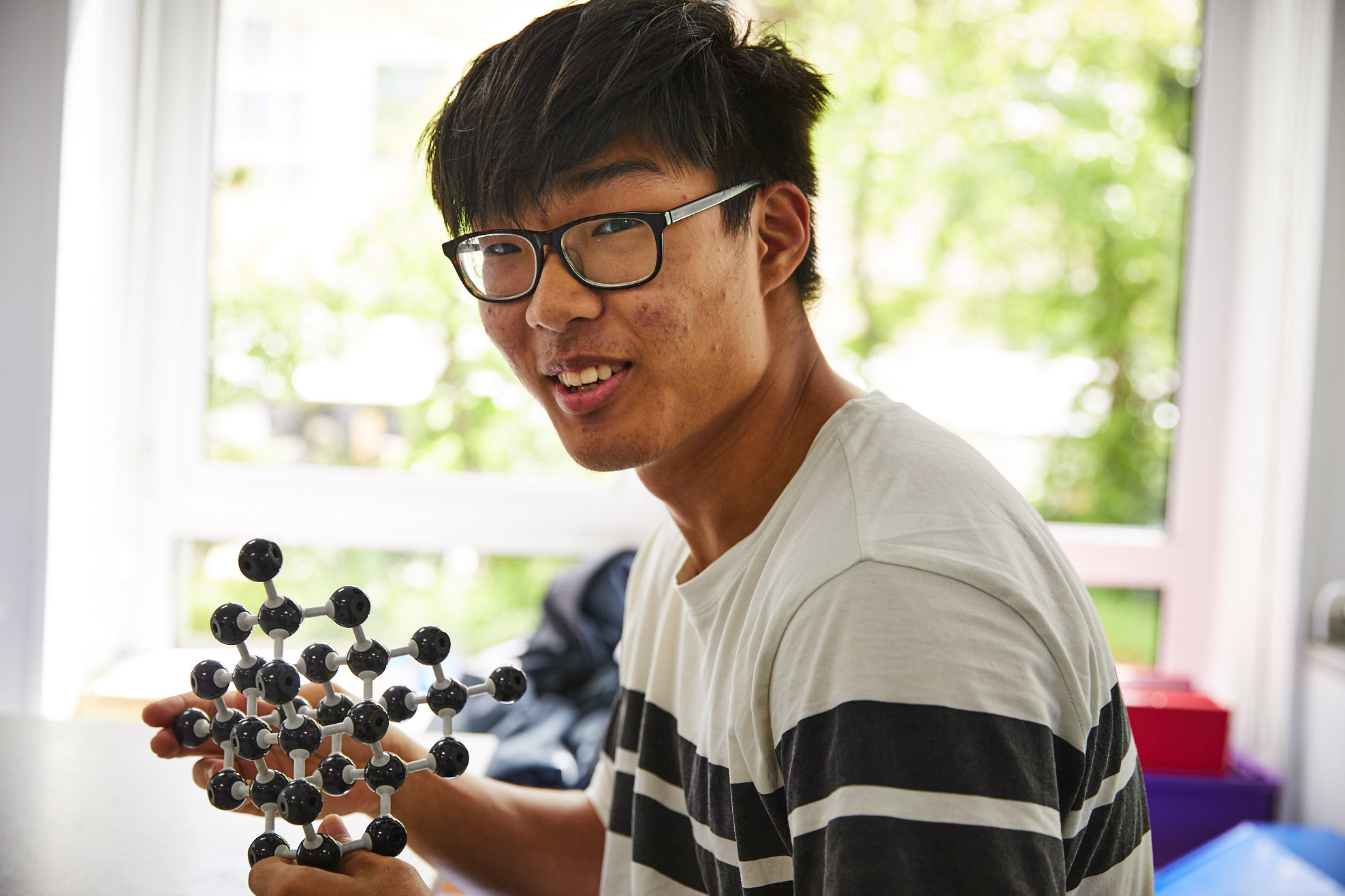
Chemistry
 It's hard to think of any manufactured product that did not need the creative talents of a chemist at some stage in its development. Find out how chemistry contributes to our quality of life by enabling us to make new substances ranging from detergents and plastics to anti-cancer drugs and by helping us to monitor the environment, detect crime and much more.
It's hard to think of any manufactured product that did not need the creative talents of a chemist at some stage in its development. Find out how chemistry contributes to our quality of life by enabling us to make new substances ranging from detergents and plastics to anti-cancer drugs and by helping us to monitor the environment, detect crime and much more.
OCR Chemistry
Chemistry is an exciting and relevant science that provides answers to everyday questions through a practical and problem-solving approach. If you study chemistry in the Sixth Form you will meet intellectually challenging ideas and consider numbers infinitely large and particles infinitesimally small.
You will gain an understanding of the molecular complexity of the world around us and an insight into how and why chemical reactions happen. Yet your study of chemistry will not be simply an encounter with fundamental ideas and concepts but the development of a wide range of transferable skills that will last a lifetime.
Beyond the classroom
During the course you will have many opportunities to extend your studies, including the chance to compete in events such as the Cambridge C3L6 competition, the International Chemistry Olympiad and The RSC Schools’ Analyst Competition. Scientific work experience opportunities also arise through the Nuffield Bursary Scheme and our local Cambridge connections.
Course content
- Module 1 – Development of practical skills in Chemistry: skills of planning, implementing, analysis and evaluation
- Module 2 – Foundations in Chemistry: atoms, compounds, molecules and equations; Amount of substance; Acid–base and redox reactions; Electrons, bonding and structure
- Module 3 – Periodic table and energy: the periodic table and periodicity; Group 2 and the halogens; Qualitative analysis; Enthalpy changes; Reaction rates and equilibrium (qualitative)
- Module 4 – Core organic Chemistry: basic concepts; Hydrocarbons; Alcohols and haloalkanes; Organic synthesis; Analytical techniques (IR and MS)
- Module 5 – Physical Chemistry and transition elements: reaction rates and equilibrium (quantitative); pH and buffers; Enthalpy, entropy and free energy; Redox and electrode potentials; Transition elements
- Module 6 – Organic Chemistry and analysis: aromatic compounds; Carbonyl compounds; Carboxylic acids and esters; Nitrogen compounds; Polymers; Organic synthesis; Chromatography and spectroscopy (NMR)
Assessment
Three written papers
- Paper 1: 2hr 15 minutes, 100 marks
Periodic table, elements and physical Chemistry on content from modules 1, 2, 3 and 5
- Paper 2: 2hr 15 minutes, 100 marks
Synthesis and analytical techniques on content from modules 1, 2, 4 and 6
- Paper 3: 1 hr 30 minutes, 70 marks
Unified Chemistry on content from all modules
Practical work
Your knowledge and understanding of practical work will be assessed as part of the written exam papers. The A Level will include at least 15% of the written papers covering knowledge and understanding of practical. At A Level your practical work will be also be endorsed on your examination certificate (pass/fail).
FAQs
Where can Chemistry lead to?
Chemistry is usually the required course for study of Medicine but can also lead into the experimental sciences at university as well as being viewed well for Engineering and Material Science. However many students simply study Chemistry at Sixth Form as a contrast to non-science subjects and as they find it interesting.
What background is needed?
A good grounding in sciences from GCSE is essential for good progress in Sixth Form, but this can come from the Triple Award or a high mark in Combined Science. All the sciences are much more mathematical at Sixth Form, so a good skill there is recommended especially if you are not studying Mathematics further.
What type of work is involved?
The theory at Sixth Form builds on that learned at GCSE and many of the topics will be familiar. With two teachers in each class, they will teach different aspects of Chemistry such as Organic and Inorganic topics. There is also a strong practical component where students will develop skills in increasing complex experiments and also be involved in planning and assessing the risk of their work.
What happens if I did not do much practical work at GCSE?
Each year we have students with a range of practical skill at the start of the course. We will not assume knowledge of any particular techniques and so introduce them all in detail. If students are struggling, extra opportunities to practice and gain confidence are available through the lunchtime enrichment sessions.
How big are the classes?
Chemistry is one of the most popular subjects at Sixth Form so it has a more classes than most. The laboratories are a decent size and fit a maximum of 14 students, but a typical A-level class is nearer to 10-12 students.
How many teachers do I have?
As with many subjects at Sixth Form, each Chemistry class will have two teachers. For A-level they will have the same amount of time each week. They will teach different topics in parallel with each other.
How is the course examined?
There are three papers at the end of year 13, the first two split the content between them and then the third paper called “Unified Chemistry” is synoptic and also requires the student to apply their knowledge to new situations.
Is the practical work marked?
The experiments undertaken during the course form part of what is called Practical Endorsement, which is a pass/fail grade that goes alongside the final mark. Students have to show competence in 13 experimental categories through the two years. There is no actual marks from this towards their final grade, although there are questions about experimental design and procedures on the written paper.
Is Practical Endorsement important?
A pass in this is usually required for any University course involving experimental sciences or a practical component such as Engineering. If a student is applying for a language or humanities it will not matter and entry is only on the grade, however it is very unusual at the Sixth Form for a student to be at any risk of failing Practical Endorsement and support will be given early on to students who find practical work more challenging.
Is there any coursework or optional topics?
No, all coursework was removed from A-level science in the last reform and the optional topics that previously existed were either removed or folded into the core topics. With the increase in mathematical content, topics like the Arrhenius equation that used to be met in coursework are now taught in the course.